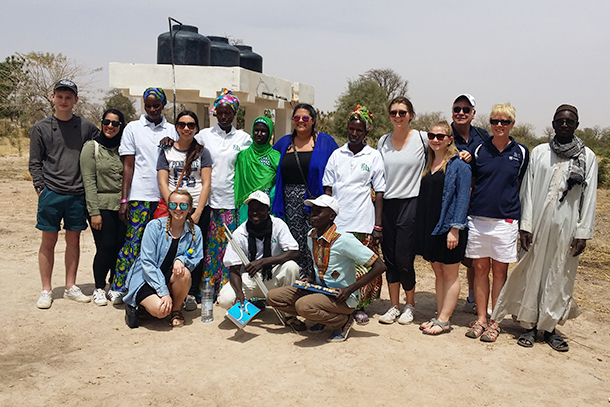
Engineering Leadership Development students spent their spring break aiding Senegalese farmers.
Trip to Senegal provides eye-opening experience for students and instructors
Engineering Leadership Development students’ designs positively impact Senegalese farming
07/28/17
UNIVERSITY PARK, Pa. — Students in the Engineering Leadership Development (ELD) minor experienced the fruits of their labor through the testing of farming product prototypes in Senegal, a country located in West Africa.
Mike Erdman, Walter L. Robb Director of Engineering Leadership Development and instructor in engineering science and mechanics, and Dena Lang, associate director of engineering leadership research, traveled to Senegal with a group of ELD students to learn about new cultures and the real-world applications of their engineering leadership coursework.
“The overall project was to identify techniques and equipment that people would use to effectively grow moringa,” Erdman said.
While the moringa plant is known for its rapid growth in harsh climates, the students wanted to see how such a sturdy plant could thrive in Senegal, a country with dry soil and little rain.
In order to prepare for the trip, students completed in-depth research and reports on the moringa plant and put together rough prototypes of their tools: an inexpensive solar-powered water pump, a device to unwind scrap plastic bottles into strips for fencing material or everyday use, and a simple, hygienic washing station for cleaning leaves from the plants. Erdman and Lang traveled with seven students, each of whom had taken the Engineering Leadership Development capstone course the previous semester and had concentrated on learning and improving an important aspect of growing and processing moringa.
As instructors, Erdman said, he and Lang focus on teaching students to lead, hone their empathy, and innovate unique solutions to problems. When students were devising the water pump, Erdman pushed them to develop the absolute least expensive solution, encouraging them to continuously simplify the solution until they arrived at the actual prototype taken to Senegal.
To present their findings, the students traveled to three farms during the trip, including a farm owned by Papa Fall of Sunu Harvest and two farms connected to Senegalese government agricultural agencies.
The ELD program’s connection with Papa Fall allowed students to interact with high-ranking Senegalese government officials such as the vice prime minister of agriculture. While working with the officials to increase and develop more effective agricultural techniques, the students had the opportunity to demonstrate the farming products they designed, including a technique to create clean water for washing the moringa. The washing equipment was assembled and tested in Dakar, the capital of Senegal.
“The students assembled their equipment and tested it. Further, they provided detailed reports on their studies on the farming and processing of moringa. All three agencies were really excited about what we were doing and the potential for future engagement,” Erdman said.
One of the most important prototypes created by ELD students was the low-cost well pump. Because the Senegalese climate is so dry, it’s hard to get enough water to grow crops, particularly large crops.
In many locations, women need to trek long distances to provide water for their families and to grow crops. To try to improve the current watering system, Lang said students spent a day assembling the inexpensive portable water pump. Erdman estimated that the pump was able to produce about 10 gallons of water per minute, an amount adequate to irrigate a small family farm.
Even with more effective watering systems in place, there are still farming problems in Senegal. Animals regularly come by and snack on the carefully grown plants. Unfortunately, materials for creating fences to prevent these pests are in very limited supply.
Because plastic waste is an issue in Africa, with plastic bottles discarded in landfills, along highways and in empty lots, ELD students found a way to use the bottles to protect farmers’ crops. By unspooling the water bottle with a simple tool that students created, a 10-foot strip of plastic could be created for fencing material or other practical uses.
When students showed their findings to the Senegalese government officials, Erdman said they were pleased with the results, particularly with the long strip of plastic created from the old water bottles. Aided by the University of Dakar, they believe that these sustainable technologies fit well with the Senegalese model for agriculture. Follow-up is planned with Penn State’s Global Programs to establish collaboration with local universities and expand the involvement of other colleges at Penn State.
In addition to presenting their farming products to Papa Fall, other farmers and Senegalese government officials, students also visited with members of the local village, learning new traditions and witnessing the thousand-year-old process of creating baobab powder.
Students also met with two groups of women who had organized their own female-run business initiative selling cashews. Lang said the men of the village often leave to find work, so the women need to find ways to make money within the village. In some cases, they do this by growing and harvesting cashews.
Though it was possible to make more money by selling roasted cashews, the women mainly sold raw cashews because the process of drying, peeling and roasting cashews is too laborious — and dangerous, with exposed flame and harmful smoke. Instead of working with more modern technology, women had used a cylinder full of holes over a fire to roast the cashews, the flammable oil of which would often catch fire.
Although the Senegalese government helped the women build a safer, more efficient furnace, they still could only work during the day because they didn’t have electricity to light up their work areas. ELD students have worked on inexpensive solar-powered lights that can help provide the women with light, increasing their available work hours. By cutting a small hole in the tin roof of the production factory, light could be brought in during the day while also using solar power to charge a battery that could run the student-designed system and release light into the building after sundown.
The group also had the chance to have dinner with Papa Fall’s family, where they were able to put together the system to wash moringa leaves, commonly used in African cooking. The filter uses ozone from an inexpensive gas generator to purify the water that is used to clean the leaves. The group also traveled to Gorée Island, the westernmost tip of Africa, where the beginnings of the slave trade were established.
Although the students’ accomplishments were impressive, Erdman and Lang still believe there’s more to be done in Senegal — a venture they hope Penn State can continue to help with. Water distribution systems could be more reliable, irrigation paths could be established, and the students’ leaf-washing technology could be further developed to include a drying component. Both Erdman and Lang hope to take things to the next level next semester.
“In general, the students came back with a much better appreciation for the potential they have to impact the world,” Erdman said. “They better understand the value they can provide to a needy part of the world.”


